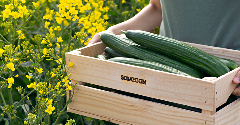News
How (and why) should food brands leverage social media?
27 Jul 2022
Social media is a powerful and far-reaching tool which allows brands to get closer than ever before to their consumers. To reap its value, brands should closely monitor consumer attitudes on social media and proactively engage with them.
Social media is by no means a new phenomenon. In a little over a decade, it has become the go-to means of connecting with consumers for the overwhelming majority of brands, research conducted by Harris Poll for Sprout Social, a social media analytics company, shows.

Today, over 70% of companies surveyed depend on social media for consumer engagement, and as the world continually becomes more tech-centric, this figure is only expected to rise. So much so that some 91% of executives anticipate that their company’s social media marketing budget will increase over the next three years, rising by more than 50% in most cases.
The food and beverage sector is one industry that has certainly not shied away from jumping on the social media bandwagon. Thanks to its universal ability to transcend cultures, geographies and audiences and bring people together, food and drink are regularly among the most popular, trending topics on the largest social media sites.
As brands begin to understand the value that social media can bring to their business, more are using it to influence commercial decisions, touching every area from research and design to sales and marketing.
Social media allows brands to better understand and connect with consumers
Allowing companies to reach more people than ever before in short time periods, social media gives brands direct access to consumers and transforms the ways in which products are traditionally marketed and sold.
Not only that, analysing consumer behaviour on social media may well provide one of the most accurate insights into the types of products that people are demanding.
Across the Asia-Pacific (APAC) region for instance, McKinsey data shows that 70% of Gen Z consumers learn about new consumer goods brands via video-based social media at least once per month, and cite this as a key driver of product-purchase decisions. As this cohort gains greater purchasing power, the value that food and beverage brands can derive from social media channels is only set to rise.
Social media as a driver for sustainability
One trend that has taken the social media world by storm is sustainability. In the food industry, the plant-based boom saw plant-based alternative product launches grow by over a third in 2021, according to FMCG Gurus, as more and more consumers make the switch to animal-free diets.
From March 2020 to 2021, the volume of conversation on social media around sustainability close to doubled, from 26,000 to 43,000 mentions. Averaging 88% throughout 2021, sentiment around sustainability has remained consistently high amongst consumers, with initiatives such as #WorldFoodDay in October causing peaks in engagement.
Looking at the conversation worldwide, the US, UK and India are the top countries directing their social media attention to food sustainability topics with 41%, 17% and 6% of mentions respectively.
When it comes to demographics, Gen Z is considered the most climate-conscious consumer-base and is most likely to demand that businesses do more in the realm of climate-activism and corporate responsibility. A global study by the Lancet found 60% of young people globally are very or extremely worried about climate change, while in the US, seven in 10 said they were more likely to shop sustainable products since the pandemic.
Advice for brands
When it comes to the ways in which brands can leverage social media to advance their business and better connect with consumers, closely following the demands and attitudes of their target audience on social media and being proactive about how they engage with them is a good place to start, a recent WGSN report suggests.
Particularly when it comes to sustainability, brands should go above and beyond expectations to aid in establishing positive brand image.
“Aid optimism by assisting eco-anxious consumers in small, personal actions that contribute to the cause and lend your voice to lobbying efforts for greater change at the top. Back these actions via measurable and transparent initiatives committed to improving the impact of your company while contributing to systemic change,” Matt Polie, associate editor, WGSN says.
PepsiCo and Coca-Cola are two companies that are already leading the curve in this respect. From February to May 2021, Coca-Cola won some 5,723 accolades online for sustainability efforts, followed by Pepsi, which bagged 4,633. These same two brands also received the highest number of social media mentions for their sustainability initiatives, namely Coca-Cola’s recyclable packaging and PepsiCo’s sustainable farming programmes.
Related news

Soy story: WWF scores UK supermarkets on sustainability efforts
12 Nov 2025
WWF has published its latest “Soy Scorecard”, ranking UK supermarkets’ efforts to combat deforestation and land conversion in their soy supply chains.
Read more
Standing Ovation and Bel scale up casein production from dairy co-products
11 Nov 2025
Foodtech company Standing Ovation has partnered with cheese specialist Bel Group to manufacture dairy serums for industrial-scale casein production via precision fermentation.
Read more
New UPF standard hoped to offer consumers ‘coherence and clarity’
10 Nov 2025
Ingredients companies are being urged to enter “a new era of partnership and innovation” following the launch of the industry’s first non-UPF verification scheme.
Read more
Whistleblowers accuse UK meat industry of promoting cheap, unsustainable supply
7 Nov 2025
An anonymous group of industry insiders has accused the UK’s biggest food companies of systematically driving down meat quality and welfare standards.
Read more
Bord Bia presents Irish dairy ingredient suppliers at Fi Europe
6 Nov 2025
Dairygold Co-operative Society, The Carbery Group, and Ornua Co-operative: Meet with sustainable producers of Irish dairy ingredients at Food ingredients Europe 2025, Hall 7.2 Stand M18.
Read more
AI attraction means foodtech startups must ‘prove’ rather than ‘promise’
4 Nov 2025
Reports suggest that artificial intelligence (AI) is sucking investment from foodtech and agritech, but investors say the picture is complicated.
Read more
Penguin and Club bars no longer classed as chocolate
30 Oct 2025
Penguin and Club bars can no longer be classified as chocolate after the pladis-owned McVitie’s brands turned to cheaper alternatives amid the ongoing cocoa crisis.
Read more
Could plant-based protection replace plastic packaging?
29 Oct 2025
Swedish foodtech company Saveggy has launched an additive-free plant-based protection for cucumbers, offering a waste-free packaging solution for fruit and vegetables.
Read more
Does promoting protein content push up plant-based sales?
27 Oct 2025
Promoting the protein content of meat-free products is a more effective sales strategy than adding carbon labels, a study of UK bakery chain Greggs suggests.
Read more
Amazon Grocery launch aims to balance quality with affordability
22 Oct 2025
Global e-commerce giant Amazon has introduced a new private-label food brand, combining existing Amazon Fresh and Happy Belly products with new everyday items.
Read more